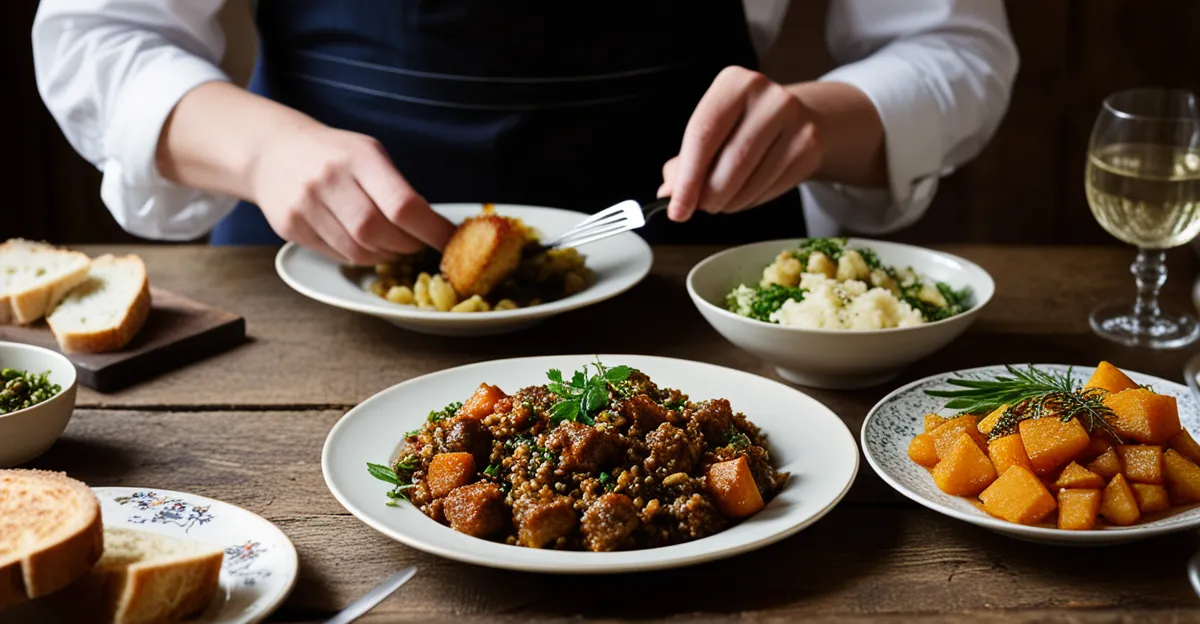Essential Strategies for Healthier UK Classics
Making traditional British dishes healthier is achievable through smart healthy ingredient swaps that reduce fat and calories without sacrificing the authentic flavors cherished in the UK. The key lies in thoughtful kitchen tips that prioritize nutrition and taste equally. For example, swapping out full-fat cream for low-fat yogurt in sauces or casseroles cuts calories significantly while maintaining a creamy texture.
Another effective technique is incorporating more whole grains and vegetables into recipes, boosting fiber intake and overall nutrition. Using lean proteins like turkey or legumes instead of fatty cuts in shepherd’s pie preserves the hearty appeal but lowers saturated fat content.
Also read : British Cooking Techniques: What Are the Essential Tools Every Chef Should Have?
Maintaining the delicate balance between health and flavor is vital. One can adjust seasoning blends and cooking times to enhance taste despite ingredient modifications. This ensures the classic British food experience remains satisfying.
Nutritionally, these modifications offer substantial benefits: lower cholesterol, fewer calories, and more vitamins and minerals, supporting overall well-being. Employing these healthy ingredient swaps paired with practical kitchen tips empowers cooks to enjoy beloved classics while embracing healthier eating habits. Carefully choosing and altering ingredients makes traditional British cuisine a nourishing part of a balanced diet.
Have you seen this : What Are the Most Popular British Dishes to Try at Home?
Ingredient Swaps for Popular UK Dishes
Choosing the right ingredient substitutions transforms traditional UK classics into nourishing meals without losing their charm. For instance, fish and chips traditionally use white flour batter and deep frying. A healthier British recipe adjustment replaces white flour with wholemeal flour or chickpea flour for added fiber. Instead of deep frying, shallow frying or air frying reduces fat content while preserving crispiness.
In shepherd’s pie, swapping fatty minced beef for lean turkey or plant-based mince significantly cuts saturated fat. Incorporating vegetables like carrots and peas into the filling increases vitamins. The potato topping benefits from using mashed sweet potatoes or cauliflower mash to reduce starch and add nutrients.
Sunday roast offers opportunities to choose lean protein cuts such as chicken breast or lean beef and to substitute buttery roast potatoes with those cooked in olive oil or roasted parsnips, enhancing healthy fats and antioxidants.
These recipe modifications maintain familiar textures and flavors, easing the transition to healthier British recipes. By consciously selecting whole grains, lean proteins, and plant-based alternatives, cooks can enjoy classic dishes with improved nutrition and less guilt, demonstrating the power of thoughtful ingredient substitutions in everyday cooking.
Healthier Cooking Methods for British Recipes
Adopting low-fat cooking techniques significantly enhances the nutritional profile of beloved British dishes while preserving their classic appeal. Many traditional recipes rely on frying, particularly deep frying, which increases saturated fat and calorie content. Switching to air frying offers a crisp texture akin to deep frying but uses minimal or no oil, resulting in fewer calories and less unhealthy fat.
Baking and grilling also present effective methods for preparing meals like pies and puddings. These techniques avoid excess fat absorption and help retain moisture and flavor. For example, baking a shepherd’s pie with lean protein and vegetables allows flavors to meld without added fats. Grilling lean cuts for a Sunday roast reduces fat while maintaining satisfying taste.
These kitchen tips encourage reducing saturated fats without compromising texture. Air frying fish and chips yields a golden, crispy finish traditionally achieved via deep frying but with healthier benefits. Similarly, roasting vegetables in olive oil instead of butter adds antioxidants and healthy fats.
Beyond fat reduction, these cooking methods conserve nutrients and support weight management. Embracing baking, grilling, or air frying transforms dishes into balanced meals, highlighting how simple shifts in preparation promote consistently healthier British food while respecting authentic flavors.


